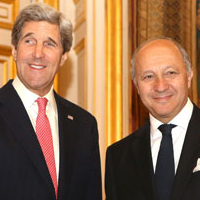John Kerry in Paris: Convergence and Divergence
 John Kerry and Laurent Fabius (photo: French Ministry of Foreign Affairs)
John Kerry and Laurent Fabius (photo: French Ministry of Foreign Affairs)
John Kerry met on March 27 with French Foreign Minister Laurent Fabius, who described Kerry as an “experienced politician” with “excellent knowledge of French and European issues and whose broad vision of international affairs is not very different from ours.” They exchanged views on major international issues, such as the lifting of the arms embargo on Syria and the Free Trade Agreement between the US and the European Union. Fabius reminded Kerry that France is ready to play its role in the Middle East peace process, adding that it is a “priority.”
The two ministers also expressed their converging views on “the unacceptability of violence perpetrated by the regime” in Syria and "concerns about the risk of chemical warfare.” They also discussed “the need to address all the components of the problem to solve the crisis” in Mali, the importance and the “urgency” to implement the provisions of the Libreville agreement in Central African Republic, as well as the “need” for “open, free and transparent elections” in Afghanistan.
Kerry then met French entrepreneurs to “discuss ways to promote economic growth and create jobs on both sides of the Atlantic,” according to a spokeswoman for the French Ministry of Foreign Affairs. His purpose was mainly to promote the future free trade agreement between the United States and the European Union, which the U.S. sees as an “engine for job creation and growth.”
Recalling that “the EU and the U.S. together account for one-third of all goods and services sold worldwide and more than 50% of the total global economic output,” the U.S. secretary of state believes that “it is important that we move forward quickly with the free trade agreement in order to have a profound impact on the world.” Negotiations on this agreement appear tricky for certain sectors, such as agriculture. So he tried to reassure French business owners by stating that he understands some of their fears and puts value on the “geographic dimension of certain products manufactured in France” and contends that it is “one of the best ways break the cycle [of the crisis] in Europe and to have growth.”
-Anne-Laure Chanteloup
- Top Stories
- Unusual News
- Where is the Money Going?
- Controversies
- U.S. and the World
- Appointments and Resignations
- Latest News
- Trump to Stop Deportations If…
- Trump Denounces World Series
- What If China Invaded the United States?
- Donald Trump Has a Mental Health Problem and It Has a Name
- Trump Goes on Renaming Frenzy






Comments